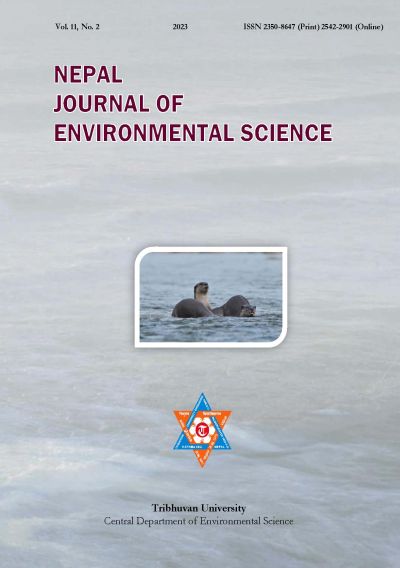Ecotoxic response of Rhizobium sp. to the commonly used pesticides (paraquat and dichlorvos)
DOI:
https://doi.org/10.3126/njes.v11i2.58031Keywords:
Emerging pollutants, median lethal concentration, paraquat, pesticide stress, toxicityAbstract
This study investigated the 96-hour ecotoxicity response of Rhizobium sp. to paraquat and dichlorvos at application concentrations ranging from 0.01 mg/L to 100 mg/L. The test organism was isolated and enumerated using yeast extract mannitol agar. Paraquat proved to be more toxic than dichlorvos based on the toxicity parameters established using probit regression analysis. Rhizobium sp. showed no growth (100% mortality) at the higher concentrations of 10 mg/L and 100 mg/L for paraquat; for dichlorvos, this absence of growth was only seen at the highest application concentration of 100 mg/L. Overall, Rhizobium sp. tolerated the insecticide, dichlorvos, better than the herbicide, paraquat. At the lowest concentration of 0.01 mg/L, it displayed moderate tolerance indices of between 0.534 and 0.589 for both pesticides. At 0.1 mg/L and 1.0 mg/L pesticide concentrations, the 96-hour tolerance indices obtained were less than 0.39, indicative of very low tolerance. Neither pesticide was tolerated at 10 mg/L and 100 mg/L. Statistical comparisons of the tolerance indices between the two pesticides and from one pesticide concentration to the other showed significant differences both within and the between groups (p≤0.05). The median lethal concentrations (LC50) were 0.0158 mg/L and 0.0350 mg/L for paraquat and dichlorvos, respectively. The lowest observed effect concentration (LOEC) and no observed effect concentration (NOEC) were 0.0011 and 0.0027, respectively for paraquat and 0.0017 and 0.0047, respectively for dichlorvos. The results indicated that pesticides have adverse acute effects on key microbial ecosystem service providers like Rhizobium sp. and should, thus, be used with restraint.
Downloads
Downloads
Published
How to Cite
Issue
Section
License
Copyright (c) 2023 Central Department of Environmental Science, Tribhuvan University

This work is licensed under a Creative Commons Attribution-NonCommercial 4.0 International License.
This license enables reusers to distribute, remix, adapt, and build upon the material in any medium or format for noncommercial purposes only, and only so long as attribution is given to the creator.

